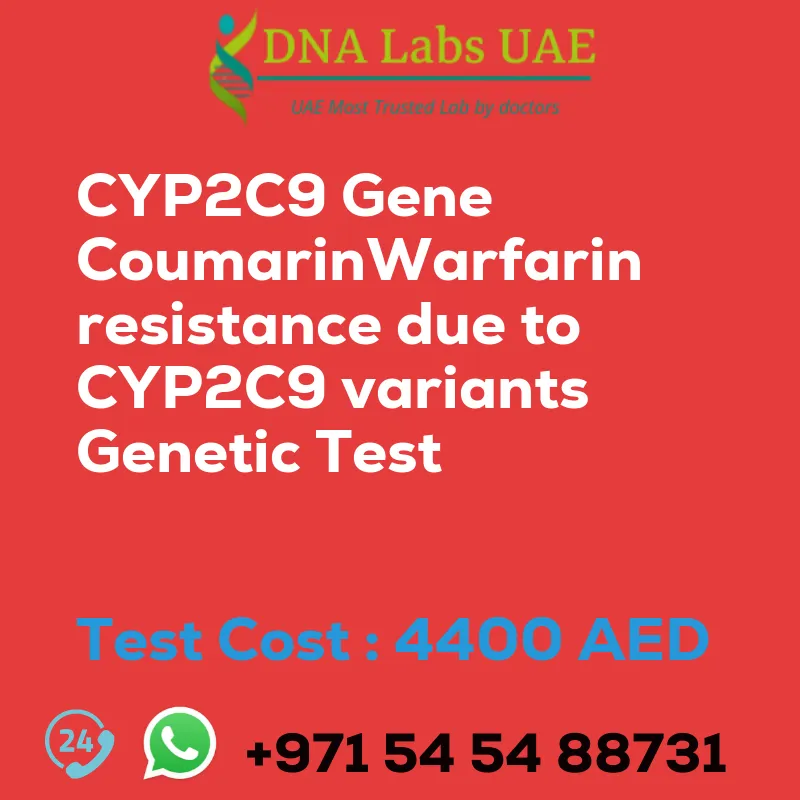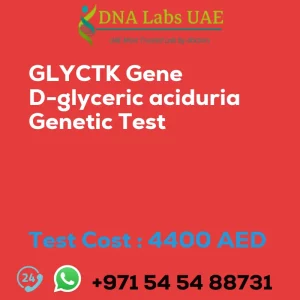CYP2C9 Gene Coumarin/Warfarin Resistance Genetic Test
Welcome to DNA Labs UAE, where we offer advanced genetic testing services. In this blog post, we will discuss the CYP2C9 gene and its association with Coumarin/Warfarin resistance. We will provide details about the test, including its components, cost, and delivery time. Let’s dive in!
Test Name: CYP2C9 Gene Coumarin/Warfarin Resistance Genetic Test
Components and Price
The test is priced at AED 4400.0. The components required for testing include blood, extracted DNA, or one drop of blood on an FTA card.
Report Delivery
The test results will be delivered within 3 to 4 weeks after sample submission.
Method
We utilize NGS (Next-Generation Sequencing) technology to perform the CYP2C9 gene test.
Test Type
The CYP2C9 Gene Coumarin/Warfarin Resistance Genetic Test falls under the category of metabolic disorders.
Doctor
The test can be requested by a general physician.
Test Department
Our Genetics department handles all aspects of the CYP2C9 Gene Coumarin/Warfarin Resistance Genetic Test.
Pre Test Information
Prior to the test, it is essential to provide the clinical history of the patient who will undergo the CYP2C9 gene test. Additionally, a genetic counseling session is recommended to create a pedigree chart of family members affected by Coumarin/Warfarin resistance due to CYP2C9 variants.
Understanding the CYP2C9 Gene and Coumarin/Warfarin Resistance
The CYP2C9 gene encodes an enzyme called cytochrome P450 2C9. This enzyme plays a crucial role in metabolizing various drugs, including the anticoagulant medication warfarin. Variations in the CYP2C9 gene can impact the activity of the enzyme, leading to differences in drug metabolism and response.
Specific variants of the CYP2C9 gene, such as CYP2C9*2 and CYP2C9*3, result in reduced enzyme activity. As a consequence, warfarin metabolism is decreased, resulting in higher drug levels and an increased risk of bleeding. Individuals with these variants may require lower doses of warfarin to achieve the desired therapeutic effect.
NGS Genetic Testing for CYP2C9 Variants
Next-Generation Sequencing (NGS) genetic testing can identify specific CYP2C9 variants and determine an individual’s potential resistance to warfarin. This type of testing involves sequencing the DNA of the CYP2C9 gene to detect any known variants.
The results of the genetic test can assist healthcare providers in selecting the appropriate dose of warfarin for an individual, minimizing the risk of adverse effects. It is important to note that genetic testing for CYP2C9 variants is not routinely performed for all individuals receiving warfarin therapy. However, in certain cases where an individual requires higher or lower doses of warfarin than expected, or experiences significant bleeding or clotting events, genetic testing may be considered to optimize their treatment.
Thank you for reading our blog post on the CYP2C9 Gene Coumarin/Warfarin Resistance Genetic Test. If you have any further questions or would like to schedule an appointment, please contact DNA Labs UAE.
| Test Name | CYP2C9 Gene CoumarinWarfarin resistance due to CYP2C9 variants Genetic Test |
|---|---|
| Components | |
| Price | 4400.0 AED |
| Sample Condition | Blood or Extracted DNA or One drop Blood on FTA Card |
| Report Delivery | 3 to 4 Weeks |
| Method | NGS Technology |
| Test type | Metabolic Disorders |
| Doctor | General Physician |
| Test Department: | Genetics |
| Pre Test Information | Clinical History of Patient who is going for CYP2C9 Gene Coumarin/Warfarin resistance due to CYP2C9 variants NGS Genetic DNA Test A Genetic Counselling session to draw a pedigree chart of family members affected with Coumarin/Warfarin resistance due to CYP2C9 variants |
| Test Details |
The CYP2C9 gene encodes an enzyme called cytochrome P450 2C9, which is responsible for metabolizing various drugs, including the anticoagulant medication warfarin. Variations in the CYP2C9 gene can affect the activity of the enzyme, leading to differences in drug metabolism and response. Some specific variants of the CYP2C9 gene, such as CYP2C9*2 and CYP2C9*3, result in reduced enzyme activity. This can lead to decreased metabolism of warfarin, resulting in higher drug levels and increased risk of bleeding. Individuals with these variants may require lower doses of warfarin to achieve the desired therapeutic effect. NGS (Next-Generation Sequencing) genetic testing can be used to identify these CYP2C9 variants and determine an individual’s potential resistance to warfarin. This type of testing involves sequencing the DNA of the CYP2C9 gene to detect any known variants. The results can help guide healthcare providers in selecting the appropriate dose of warfarin for an individual, minimizing the risk of adverse effects. It is important to note that genetic testing for CYP2C9 variants is not routinely performed for all individuals receiving warfarin therapy. However, in certain cases, such as when an individual requires higher or lower doses of warfarin than expected, or experiences significant bleeding or clotting events, genetic testing may be considered to help optimize their treatment. |








